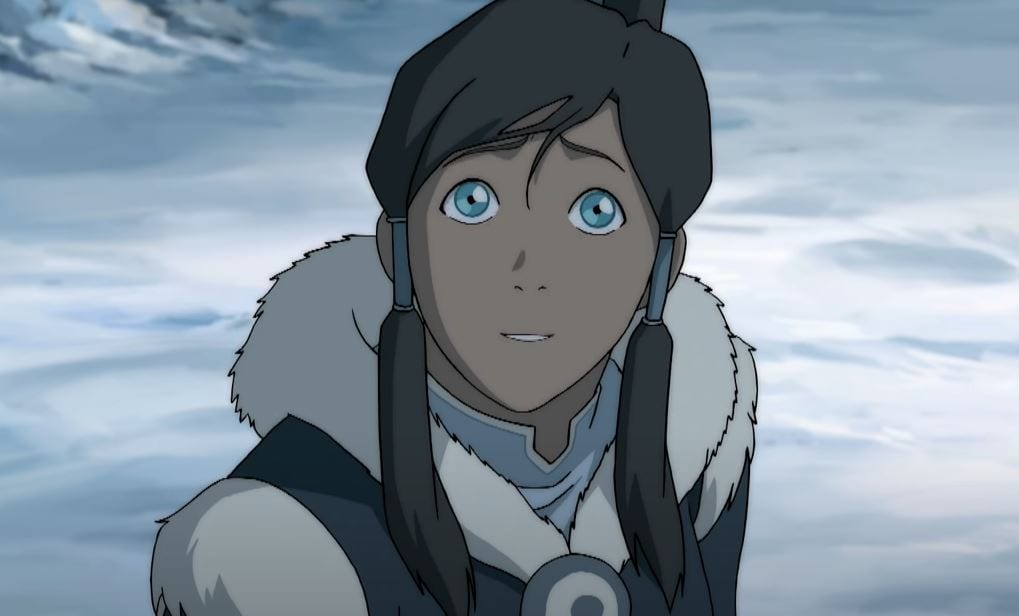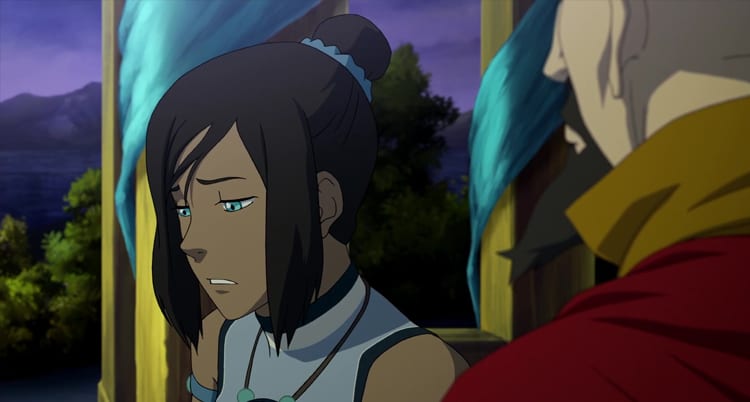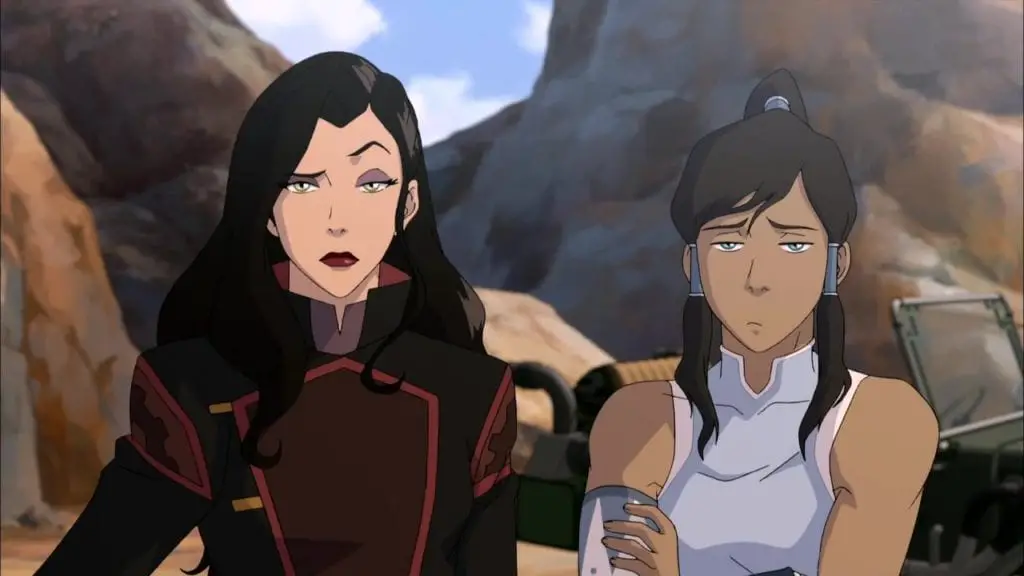Because we can’t have anything nice, and what nice things we do get are quickly turned to evil, the recent release of Avatar: The Last Airbender on American Netflix quickly turned into a chance to return to an Avatar pastime. That’s right, it’s “criticize Korra” time! People eagerly talked about how awful everything about The Legend of Korra is and wondered why we could not just get a sequel series featuring adult versions of the original Team Avatar.
(I would suggest those people check the comics and maybe find out why a sequel series would be disappointing.)
Now, I am not here to do the opposite, where I spit venom at The Last Airbender and Aang in order to make Korra look better. For one, I am in total agreement that The Last Airbender is a better show than The Legend of Korra. Secondly, Aang does not deserve to be criticized, torn down, or belittled. He is a great character. Thirdly, I don’t have to make Aang look worse to make Korra look better. Korra is strong enough on her own that tearing Aang down is not necessary.

So much of what people seem to hate about Korra tends to involve her character in Book 1 of the show. She is impulsive, stubborn, and makes bad decisions that worsen the conflicts around her. Korra is also quite cruel to Tenzin at times, creating significant tension between them. I understand why this can be a hard first impression, especially compared to Aang’s easy likability. However, I do not understand why Avatar fans find it so hard to look past Korra’s personality. Of all the fandoms out there, Avatar fandom should be the one that can find the good at the heart of Korra’s personality.
Think about it. A stubborn, prideful, angry, sometimes mean person who is confrontational towards their older mentor and makes bad decisions out of their eagerness to prove themselves? How does this not sound exactly like Zuko? There are noticeably clear similarities between Korra and Zuko that make me wonder why one character is so universally loved and the other is divisive.
I am always surprised at how unwilling some Last Airbender fans are to even consider Korra when her character is so similar to the most beloved character of their preferred show.
Much the way Zuko’s arc focuses on a more relatable, personal character conflict that must be resolved in the face of the larger threats in the world, Korra’s arc very much does the same. Her conflict is not the larger thematic debates of war, death, and culture that Aang faces. Korra instead faces rich inner conflicts, where she is desperately trying to figure how to find peace within herself while also bringing peace to the world. It is a messy arc, a winding path that sometimes doubles back on itself and makes her work hard for her happy ending.
Korra does not get a single path to redemption and self-realization the way Aang does. She solves one conflict, only to see it all fall apart the next season. She saves the world one season and is kicked out of Republic City the next. She wins the day and has the world leave her behind the next. This makes her ultimate triumph and inner victory incredibly rewarding and emotionally satisfying, much the same way Zuko’s uncertainty and missteps do.
As great a character as Aang is, his path is basically straightforward. He starts here and ends there. The path rarely deviates from the climb up the mountain. His end goal never changes. Aang is more of a myth come to life and often has the feel of a grand myth. His story is that of superhuman tale that ends with the great hero defeating the grand evil.
If someone prefers this arc for their main character, then great. No complaints here. The Last Airbender gave Aang a beautiful, rich, complex hero arc that has been rightfully lauded by fans and critics both young and old.
Many people do prefer how Korra feels more intimately human and flawed. We prefer how her arc is more explicitly about defeating her inner demons, with each season presenting a new conflict based on the consequences of how Korra solved the conflict of the previous season. The only exception would be Book 2, which is a very blatant Good Vs. Evil beyond even Aang’s fight against Ozai. This black and white feel is also why Book 2 is the least popular season of Korra. Even this poorly received storyline, though, has real meaning for Korra’s character and the journey she takes.
There is something truly rewarding to seeing Korra find her path, and how we can watch The Legend of Korra grow alongside her. Avatar creators Bryan Konietzko and Michael DiMartino (Bryke) stepped fully out of their comfort zone to create Korra. They openly stated how they set out to create the opposite of Aang, and you can see how they struggled to make it work. Korra was a challenge for them. She required them to learn something themselves. They were forced to look at the character they created and figure her out.
Season by season, you could see this process play out. Book 1 forces Korra into a familiar, stock-issue ending that did not really work for her, but it was what worked for the creators last time. Book 2’s ending, despite all of the season’s messiness, realized how Korra represented something different for them and the Avatar world, and began transforming both their style and the mythology to fit her. By the time Book 3 rolled around, they finally had a grasp of this character and it resulted in the two best seasons of the show.
The Legend of Korra demanded both its audience and writers to come to grips with Korra in a way that makes you invest in her and understand her in a way Aang never demanded. I can easily enjoy The Last Airbender without feeling particularly invested in Aang. The rest of the cast is so incredibly strong, and the storytelling outside of him so skillful, that Aang himself can fall by the wayside. I want Katara, or Zuko, or Toph, or Iroh to win. I can invest in the group, rather than Aang personally.
And perhaps this is why The Legend of Korra is so much more divisive. Some people just will not invest in Korra’s character. Since she is so dominating a force, not investing in her means you will struggle to care about the show. Mako, Bolin, and Asami gradually grew into a great supporting cast over time (with many loving Asami and Bolin right away), but they still didn’t compare to the original Gaang, each of which were plenty strong enough to helm their own shows.
With Korra positioned as such a combative, divisive, and different main character, I can understand why people were turned off by Book 1 and never looked beyond her Book 1 characterization. Even Turf Wars, for some reason, reverted her back to Book 1 characterization. The problem is the huge disservice this does to Korra’s character.
Book 2 Korra is not the same person as Book 1 Korra. Book 3 is not the same as Book 2. Those who dismiss her for the person she is in Book 1 are simply refusing to engage with her arc at all. It feels like they do not even try to understand why she acts how she does.

What makes Korra so rewarding and compelling a main character is the way the narrative constantly challenges both her and itself. The best way to compare Korra and Aang is to recognize how they each were meant for each other’s times instead of their own. The Legend of Korra takes place in a time of great spiritual and diplomatic change that Aang would have thrived in. Korra, on the other hand, is a bending dynamo, a uniquely powerful and gifted fighter even among Avatars. She was built to fight and would have been exactly the Avatar needed to ward off the Fire Nation. This is the type of Avatar she desperately wants to be. Instead she was left with spiritually complicated conflicts she was ill-equipped to handle.
Where Aang was allowed to take the traditional role of an Avatar, Korra became something else entirely. The times forced her to become a new Avatar for an entirely new cycle, the Avatar who not only defined her times, but the times moving forward indefinitely.
This also forced Korra to define herself. Where Aang’s arc was about him retaining his sense of self in the face of circumstances trying to force him to change, Korra had to discover a new way of being the Avatar. Bryke set out to create a character opposite of Aang in every way, and that included the world she was born into. Aang was Avatar to a world that desperately needed him. Korra was Avatar to a world that did not need, and many times did not want her. The key to her arc is how she had to become an Avatar to this type of world, rather than another Aang. She could never be Aang and should not have tried.
Her character arc demanded the audience to stop thinking of her in Aang’s terms as well, and it is a shame more fans could not do that.
Much of the argument between The Last Airbender and The Legend of Korra does come down to your level of attachment to the former and your willingness to accept how the latter obliterated so much about the former. Whether they initially intended to do so or not, Bryke had Korra fundamentally rewrite the Avatar world. The Avatar cycle literally started anew and erased the past in the process. Harmonic Convergence created new airbenders and reset the spiritual cycle of the world.
Bending changed. Heck, even the importance of bending was rewritten. The setting left behind the ancient, mythological feel in favor of something more modern.
We can argue about this, for sure, but fans tend to punish Korra for their opinion on the changes around her, rather than judge her arc as it exists. They punish her for their complaints about the worldbuilding, rather than analyze the intent of this different worldbuilding and what it means for her arc. Judged on its own, Korra’s arc is one of great transformation of both the world and herself.
By the time Books 3 and 4 roll around, all the struggles and messy false starts in Korra’s arc round into something truly remarkable, as Korra finally begins accepting how the world and her place in it have changed into something she never expected. She begins embracing this new direction. Her stubbornness starts finding focus and direction, and she recognizes the proper moments to suppress it. Her aggression tones down as she begins choosing her battles more wisely. She finds the purpose she craved in the search for the new airbenders, only to see it lost when she is poisoned and forced to spend years rehabbing.
Korra develops into a fully matured and fascinatingly developed character. Every usual complaint about her character no longer applies. She is no longer trying to solve everything with a fight. Her relationship with Tenzin has developed into one of the most important bonds in both of their lives. Her stubbornness has relented. All the cliché, boring romantic storylines have vanished in favor of a balanced, supportive relationship with Asami.
We have seen her go through so much and come out stronger, while still bearing the scars of those struggles. The show’s quality may have peaked and valleyed alongside her, but it felt truly, genuinely worth it in a way not many shows have ever managed for me. Her ending feels truly earned.
Korra does absolutely nothing throughout her show that does not come with immediate consequences. Detractors are quick to point out the Book 1 ending, with Aang restoring Korra’s lost bending, as proof of how Korra does not face consequences. This is a disingenuous argument. I will not defend that decision, because it was a bad storytelling decision. The problem is that this is one mistake that does not even come close to representing the norm for the show.
Nothing represents this better than the Red Lotus arc and Korra’s poisoning. Many would argue this was the best and defining arc of the show. How many animated kids shows would do something like that? Korra’s poisoning is not some episode-long inconvenience to shed at the end of the show. It is not there simply to even the odds against a villain. This was a meaningful, lasting plot choice seen through in ways these shows never see them through. Korra’s place in the world was entirely lost, and her recovery was not truly complete until the end of Book 4. For all the deserved credit given to Aang’s show for how it covers war, the best depiction of PTSD undoubtedly comes from its successor.
It also must be said, when discussing Korra and Aang, just how unique, meaningful, and influential Korra truly was for so many people and the entire animation industry. That is not to dismiss Aang, or the influence The Last Airbender still has. After all, we’re still here in 2020 waiting for an animated kids show that surpasses it. Everyone in the business still operates at least partly in The Last Airbender’s show.

Korra, however, was an extremely important piece of representation for millions of fans. Taken alone, she has a considerable number of important attributes that would have been special by themselves. She is not just a woman, but a woman of color. She is a muscular woman that challenged the image of what an animated protagonist must look like. The physical disability she suffers during the Red Lotus arc was something special in both concept and execution. The respect shown for her PTSD afterwards was arguably even more special and important.
Finally, of course, is her relationship with Asami and the groundbreaking effect it had on the industry. It was not just the fact that Korra ends the series in a relationship with another woman, but the way it happened. So many queer women found real meaning and representation in how Korrasami developed. It is hard to quantify the impact that this kind of representation has for those it most impacted. Too often, people seem to ignore or invalidate the impact of Korrasami when discussing Korra’s impact as a character.
You don’t have to feel the same way, but to ignore it entirely and act as if this impact does not exist does wrong by both the show and Korra.
We can debate all day about Korrasami’s true impact, and whether Steven Universe would or would not smash the barrier in the next year anyway. Ultimately, this debate does not change reality. Korrasami came first and gets that credit for its impact. For so many queer women, they find a meaning and identity in The Legend of Korra that does not exist with Aang and The Last Airbender. They will prefer the show for this meaning and to invalidate their feelings is plain wrong.
Again, you can take any of these attributes alone and call Korra both unique and inspiring. Taken altogether, you are left with this absolute norms-smasher of a character who challenges so many taboos and barriers in children’s storytelling while also retaining a consistent, compelling character arc that challenges her own writers in the same way.
Obviously, it would mean less if none of this was handled with care and quality, but it very much was.
I am not writing this with the intention of “definitively proving” that Korra is better than Aang. There is no right answer for which character is better. They are both amazing characters in amazing shows who function in complementary roles to each other. Rather, I want to present her case for why people do like Korra and her show more.
There are a great number of legitimate complaints to level at The Legend of Korra. If you search through our site, you can see how much thought and criticism have resulted from our constant over-analysis of this show. Whatever there is to complain about, I will always stand strong that Korra herself should not be among those complaints.
People like Korra more than Aang, and her show more than his, because for the right people, Korra is an absolute force of nature. She is one of the most compelling, interesting, well-developed, and representative characters in animation history. I will always argue that The Last Airbender is better than The Legend of Korra. However, this has nothing to do with Korra herself. Animation fans are extremely lucky that she exists.
Hopefully, one day, we can stop belittling Korra and acknowledge why fans love her so much.
Images Courtesy of Nickelodeon

